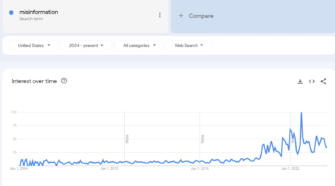What’s Worse, Actual Misinformation or Claims of It?
The World Economic Forum named misinformation as the top global risk, higher than war. I think it’s fair to say the WEF/Davos crowd ain’t exactly a representative slice of America or any other country. Maybe they know more than us, maybe their ranking is useful or maybe they are just parroting the times.

Note the explosion in “misinformation” search. And yeah, generative AI didn’t exist as a commodity in 2016 but the internet and social media sure did. Speaking of 2016, researchers analyzed the actual impact of the Russian attempts to influence the election. Here’s what they found,
- All those Russian bots on Twitter had 70% of their exposure reaching only 1% of Twitter users
- Those 1% were overwhelmingly Republican. So, if the point was to sway the election to Trump, this is akin to giving coupons to people who were going to buy anyway.
- And the number of exposures to the Russian troll accounts was exceeded by hundreds of times with non troll content. A drop in the ocean.
- The final nail in this particular misinformation coffin is that the exposure had zero effect on whether people voted and for who.
So, misinformation isn’t really the issue, it’s the impact of it. And it’s always useful to put the volume in context to the always exponentially larger firehose of other content we consume. So, is the Google trendline matching the problem or out of proportion to it?
The problem of mis/dis information, fake-news as it were, has been around forever. Julius Caesar’s son Octavian secured his position as the leader of Rome after his father’s death by spreading lies about Mark Antony, his challenger, being a traitor.
All the research on mis/disinformation – which we used to just call lies – suggests it doesn’t work to sway opinions or belief. Even factual information rarely sways opinion; the persuasion business is a fool’s errand. But, lying about things that have a tiny ripple effect on behavior can work, in theory. In Australia voting is compulsory but a misinformation campaign stated it wasn’t for a referendum vote last year. Did it work? Hard to know, turnout was higher than 2022 but it’s hard to prove a negative.
But, that sort of lie is the kind that can influence at the margins.
How about the constant drumbeat of misinformation claims? Might this cacophony help explain the dramatic decline in levels of institutional trust? The actual impact of misinformation might be akin to a cold, but the incessant claim that everything is fake or could be fake might be more terminal to the social fabric.
Kevin



Thank you for another interesting post!
You’re welcome Jim, thanks for subscribing and commenting.